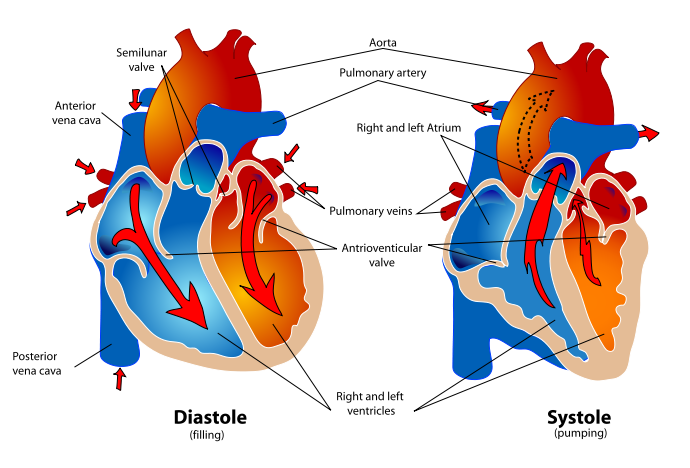
Pumping Heart
[media id=36 width=500 height=400]
A pump is a device used to move fluids, such as gases, liquids or slurries. A pump displaces a volume by physical or mechanical action. One common misconception about pumps is the thought that they create pressure. Pumps alone do not create pressure; they only displace fluid, causing a flow. Adding resistance to flow causes pressure. Pumps fall into two major groups: positive displacement pumps and rotodynamic pumps. Their names describe the method for moving a fluid.
A positive displacement pump causes a fluid to move by trapping a fixed amount of it then forcing (displacing) that trapped volume into the discharge pipe. A positive displacement pump can be further classified according to the mechanism used to move the fluid:
Rotary-type, for example, the lobe, external gear, internal gear, screw, shuttle block, flexible vane or sliding vane, helical twisted roots (e.g. the Wendelkolben pump) or liquid ring vacuum pumps.
Positive displacement rotary pumps are pumps that move fluid using the principles of rotation. The vacuum created by the rotation of the pump captures and draws in the liquid. Rotary pumps are very efficient because they naturally remove air from the lines, eliminating the need to bleed the air from the lines manually. Positive displacement rotary pumps also have their weaknesses. Because of the nature of the pump, the clearance between the rotating pump and the outer edge must be very close, requiring that the pumps rotate at a slow, steady speed. If rotary pumps are operated at high speeds, the fluids will cause erosion, much as ocean waves polish stones or erode rock into sand. Rotary pumps that experience such erosion eventually show signs of enlarged clearances, which allow liquid to slip through and detract from the efficiency of the pump. Positive displacement rotary pumps can be grouped into three main types. Gear pumps are the simplest type of rotary pumps, consisting of two gears laid out side-by-side with their teeth enmeshed.
The gears turn away from each other, creating a current that traps fluid between the teeth on the gears and the outer casing, eventually releasing the fluid on the discharge side of the pump as the teeth mesh and go around again. Many small teeth maintain a constant flow of fluid, while fewer, larger teeth create a tendency for the pump to discharge fluids in short, pulsing gushes. Screw pumps are a more complicated type of rotary pumps, featuring two screws with opposing thread —- that is, one screw turns clockwise, and the other counterclockwise. The screws are each mounted on shafts that run parallel to each other; the shafts also have gears on them that mesh with each other in order to turn the shafts together and keep everything in place. The turning of the screws, and consequently the shafts to which they are mounted, draws the fluid through the pump. As with other forms of rotary pumps, the clearance between moving parts and the pump’s casing is minimal. Moving vane pumps are the third type of rotary pumps, consisting of a cylindrical rotor encased in a similarly shaped housing. As the rotor turns, the vanes trap fluid between the rotor and the casing, drawing the fluid through the pump.
Pumping Heart , Pumping Heart Health, Pumping Heart Health Latest, Pumping Heart Health Information, Pumping Heart Health information, Pumping Heart Health Photo,Exercising for Weight Health photo, Pumping Heart Health Latest, Pumping Heart Health latest, Exercising for Weight Health Story, Healthy Minnesota Health story, Pumping Heart Video, Pumping Heart video, Pumping Heart Health History, Pumping Heart Health history, Pumping Heart over Picture, history, Pumping Heart Asia, Healthy Minnesota asia, Pumping Heart Gallery, Exercising for Weight gallery, Pumping Heart Photo Gallery, Healthy Minnesota photo gallery, Pumping Heart Picture, Pumping Heart picture, Pumping Heart Web, Malaysia Health, web Health, picture, video photo, video surgery, gallery, laparoscopy, virus, flu, drug, video, Health Health, calories, photo, nutrition, health video, symptoms, cancer, medical, beating, diet, organic, blister, exercise, weightloss, surgery, spiritual, eating, tips, skin, operation, bf1,heart


